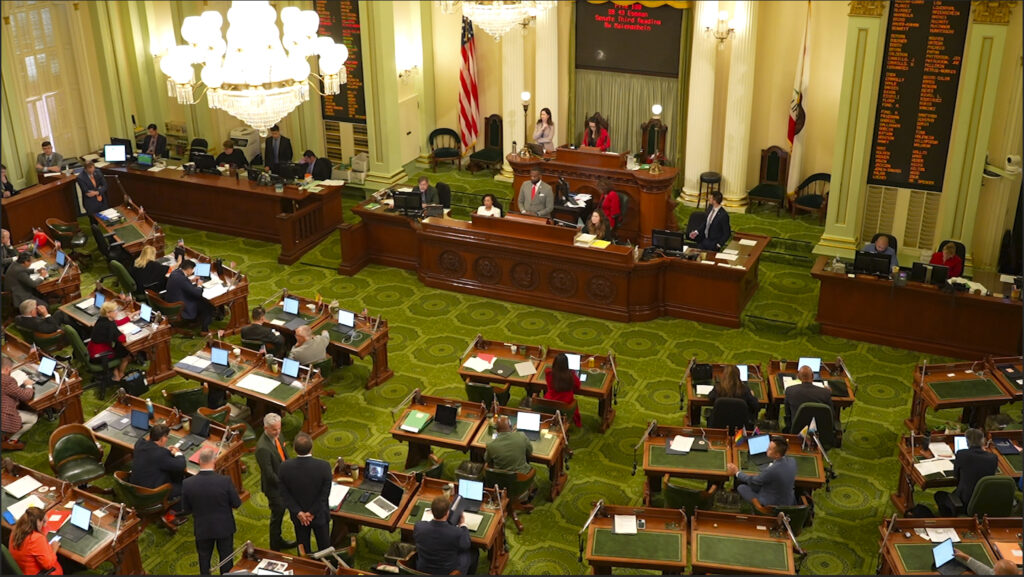
Photo: Alison Yin/EdSource
School districts around the nation are facing a terrible financial problem.
During the pandemic, they received billions in federal funding under the Elementary and Secondary School Emergency Relief fund (ESSER), which they are required to spend or commit by the fall of 2024. Meanwhile, many districts, especially ones in California, received massive increases in state funding. Recently, because of declining revenues, states are projecting deficits and education budget cuts. This means that districts, especially urban districts suffering from declining student enrollment, could be hit by the double whammy of the ESSER funding cliff and a state budget crisis.
As I traveled the state visiting our urban districts, I listened to one budget presentation after another from finance officers talking about a post-ESSER Armageddon. In the last district I visited, I sat in a packed auditorium as the CFO showed how they’d spent their one-time money on ongoing costs and funded programs that couldn’t survive. As he droned on about all the horrible things that would happen, I drifted off to sleep.
When I awoke, the auditorium was empty. I looked down at my watch and noticed it had stopped 28 days after the board presentation. I’d clearly been out for a while because my fingernails were long, and I’d grown a full beard. I’d been asleep until the Halloween day after the ESSER funding cliff. I assumed that I owed my life to the extra-large burrito I’d eaten before the board meeting. I walked out and entered the district offices, looking for signs of life. Everywhere I walked, there were overturned tables, candy wrappers and papers strewn about.
As I turned a corner, I noticed three people shambling toward me with the typical urgency of a central office manager. I was about to approach them when I realized they were zombies trying to eat me. Terrified, I ran to my car and drove away. Over the next few days, I visited schools and district offices that were filled with zombies. It was clear that something terrible had happened and that it was connected to the ESSER funding cliff, but I couldn’t fathom what.
I knew there was only one place to find the answer — the state Fiscal Crisis and Management Assistance Team. When I walked through their doors, I was relieved to find that they were still human. From the haggard looks on their faces, it was clear that they’d been working nonstop on a cure. “What the hell happened?” I asked.
A crisis team leader pointed to flow charts taped on a nearby wall. “We knew that the ESSER cliff would be bad and that a state budget crisis would make it worse. We also knew that some of our more financially irresponsible urban districts were already deathly ill. We were especially worried about the declining enrollment ones whose school boards made politically popular decisions to increase salaries with one-time money and wouldn’t make difficult decisions to lower costs, like closing small schools and cutting staff. What we didn’t expect was that the people in these zombie districts would actually turn into zombies,” he sighed.
“Is there anything we can do to fix this?” I entreated. He shrugged and motioned me toward another room.
“Ask him,” he said, pointing to a shadowy figure on the other side of a thick plexiglass wall. I looked closer and cried out, “Oh my God, that’s a zombie.”
“I prefer the term ‘differently human’,” said the zombie, who introduced himself as a local teacher’s union president. I asked him how he would cure the situation so kids could get back to school. He said, “There’s nothing to cure. We showed during the pandemic and in places like Oakland afterward that we don’t need kids to have schools. All we need are teachers. Now, we are proving it. Of course, if anyone wants to come back, we’ll welcome them with open arms.”
“But zombies eat children.” I gasped.
“Yes. There will be accidents, but the class sizes are delightful,” he said, smiling widely.
I left and again wandered the state, looking for anyone with a cure. Thinking that one of the state’s tech billionaires might be helpful, I traveled to in Silicon Valley to meet a famous one who’d focused on education and pleaded for his assistance. He listened for a few minutes and then cut me off. “Why would we help?” he said. “They did this to themselves with the tax money they took from us. Now, we have much less money which means they have less money.”
“But what about the kids?” I asked. “They can’t learn in zombie districts.”
“It’s just like New Orleans after Katrina,” he said. “Sometimes you have to destroy something that is bad before you can create something better.”
I threw up my hands, wondering what could possess people to think in this destructive way. At my wits’ end, I made one last journey to visit the Oracle at Georgetown University. She was sitting in her office nursing a cup of tea. She offered me a cup and told me I could ask two questions.
“Oh Great Oracle,” I said. “What could we have done to prevent this, and what can we do now?”
“The answer is one and the same,” she said. “School districts and their communities knew what was coming. They should have had the courage to say no to spending short-term dollars on future costs that would require ongoing funding. They must make hard choices on people and schools that they don’t have enough money for. They must have state and local leaders who will encourage them to do so, and when possible, give them cover. And those political leaders must be willing to make these choices even at the expense of their careers, knowing that they are doing the right thing. That will cure this apocalypse and prevent the next one.”
I thanked the Oracle and pledged to share her wisdom, hoping that others would listen too.
•••
Arun Ramanathan is the former CEO of Pivot Learning and the Education Trust—West.
The opinions expressed in this commentary represent those of the author. EdSource welcomes commentaries representing diverse points of view. If you would like to submit a commentary, please review our guidelines and contact us.




